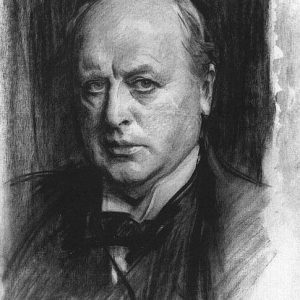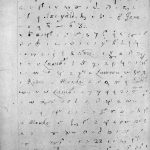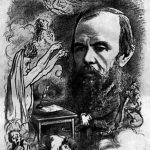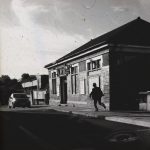Introduction: Having Some Fun with a Modernist Climax
“A Little Death is parody project in which I rewrite the same passage of Joyce’s ‘The Dead’ again and again (and again and again), in various styles, in an attempt to reveal the secrets of one of the 20th century’s most influential short stories, while also exploring other writers and forms through the imitation of style.” — Vijay Khurana

I. In the style of Henry James
the rewrite
The sensation that reached him, then, was not without its causes, for if we may approach the rooms at The Gresham by their potential to inspire certain bristling effects upon bare skin, our friend’s condition—as he lay not wholly incautiously beside his sleeping wife—could hardly be called inapposite. Conroy’s thoughts turned then to the shadowed realm which would, he considered, be the eventual object of his own consignment, though not without the company of all others of this earth, including—he did not fail to realise it—his consumptive predecessor. In that respect, the conquering notion was that rushing hence, in the full glory of some passion, might not, at last, then, be better than the slow and simple road. And as for the tented shape beside him, the warm body beneath the pall, whose form had until so recently been the inspiration of such secret fondness in him, well, she too had her secrets, and had guarded them as well as she was able.
It was then that, in a manner befitting the scrupulous generosity with which he had earlier carved the goose, given his speech and gazed upon his wife, Conroy found himself aware of his rather central role in what he recognised immediately to be a significant lachrymal event.
the original
The air of the room chilled his shoulders. He stretched himself cautiously along under the sheets and lay down beside his wife. One by one, they were all becoming shades. Better pass boldly into that other world, in the full glory of some passion, than fade and wither dismally with age. He thought of how she who lay beside him had locked in her heart for so many years that image of her lover’s eyes when he had told her that he did not wish to live.
Generous tears filled Gabriel’s eyes.
a sample of the real James, from The Ambassadors (1903)
Strether’s first question, when he reached the hotel, was about his friend; yet on his learning that Waymarsh was apparently not to arrive till evening he was not wholly disconcerted. A telegram from him bespeaking a room “only if not noisy,” reply paid, was produced for the enquirer at the office, so that the understanding they should meet at Chester rather than at Liverpool remained to that extent sound. The same secret principle, however, that had prompted Strether not absolutely to desire Waymarsh’s presence at the dock, that had led him thus to postpone for a few hours his enjoyment of it, now operated to make him feel he could still wait without disappointment. They would dine together at the worst, and, with all respect to dear old Waymarsh—if not even, for that matter, to himself—there was little fear that in the sequel they shouldn’t see enough of each other.
reflections
The narrator takes the reader by the hand (“if we may approach”; “our friend’s condition”) and even (perhaps ironically) defends the verisimilitude of the scene. Something that comes to mind is what John Gardner and others have called psychic distance, that is, the perceived distance between the reader and the character. A Jamesian narrator places more distance between us and Gabriel. We are watching Gabriel, rather than being with him.
And what does this say about some of Joyce’s own choices, like “she who lay beside him”? There is certainly distance in that, as a man’s description of his wife (more so than in, say, “one by one, they were all becoming shades”). Perhaps Joyce is being more fluid in his use of psychic distance, zooming in and out, so to speak. The effect it has in the example of “she who lay beside him” is to emphasize the distance Gabriel feels in that moment between himself and his wife. It’s a wonderful contrast to the physical closeness of their bodies, even as—literally—it describes exactly that.
And of course, Gabriel Conroy isn’t “Gabriel” in the parody—in James he could only be “Conroy” or “our friend”, which again emphasizes the distance between character and narrator, and brings an irony to the passage, inviting us to make fun of Gabriel’s suffering.
The exaggeration of James’s verbose throat-clearing (“might not, at last, then…”) manipulates our desire for meaning in a sentence: as with a “shaggy dog” joke, the longer we are kept waiting for meaning, the more exasperated we become, and the more we may tend to doubt that the meaning, when it comes, will be fulfilling.
The euphemism “lachrymal event” is stolen from Ben Lerner, who could easily himself have stolen it from James. Again, this has something to do with obscuring meaning, and thus making light of the emotional intensity of Joyce’s scene. What about the original “generous tears”? Is Joyce mocking the self-centred magnanimity Gabriel has displayed through the evening, from giving money to Lily to worrying about whether his friends will understand the references in his speech? Does Joyce’s decision to make even his tears “generous” aim at a similar effect to what the James parody is doing?

II. In the style of Samuel Pepys
the rewrite
January 2nd. With my wife to my aunts’, and there dined on a goose and were very merry. Thence by cab to my Lord Gresham’s, and I find my wife great with melancholy, which did trouble me much for I was in hopes to have a bout with her, she having washed her hair a few days before. And she telling me finally of a suitor long ago, whom she said had died for her. And so to bed beside my sleeping wife and greatly vexed in my mind, my shoulders being cold and thinking we are all to hasten to beds still colder than this. Better to go young to the gallows of passion like the suitor, whom I did envy though he is among the dead. My thoughts then of the secret Gretta hath kept so many years within her, and did picture the boy’s eyes as he told her he wished not to live. This being such as she must hold in her heart while lying by myself, great tears then filling my eyes.
the original
The air of the room chilled his shoulders. He stretched himself cautiously along under the sheets and lay down beside his wife. One by one, they were all becoming shades. Better pass boldly into that other world, in the full glory of some passion, than fade and wither dismally with age. He thought of how she who lay beside him had locked in her heart for so many years that image of her lover’s eyes when he had told her that he did not wish to live.
Generous tears filled Gabriel’s eyes.
a sample of the real Diary of Samuel Pepys
[January] 15th. [1662] Up and to my office preparing things, by and by we met and sat Mr. Coventry and I till noon, and then I took him to dine with me, I having a wild goose roasted, and a cold chine of beef and a barrel of oysters. We dined alone in my chamber, and then he and I to fit ourselves for horseback, he having brought me a horse; and so to Deptford, the ways being very dirty. There we walked up and down the Yard and Wett Dock, and did our main business, which was to examine the proof of our new way of the call-books, which we think will be of great use. And so to horse again, and I home with his horse, leaving him to go over the fields to Lambeth, his boy at my house taking home his horse. I vexed, having left my keys in my other pocket in my chamber, and my door is shut, so that I was forced to set my boy in at the window, which done I shifted myself, and so to my office till late, and then home to supper, my mind being troubled about Field’s business and my uncle’s, which the term coming on I must think to follow again. So to prayers and to bed, and much troubled in mind this night in my dreams about my uncle Thomas and his son going to law with us.
reflections
There is more than a little melancholy in Pepys’s voice, especially in the combination of mundane events and the matter-of-fact expression of emotional pain. This might provide an opening into the Creative Writing debate of showing vs. telling. In a general sense, Pepys tells us about pain (“greatly vexed in my mind”) where Joyce shows it. The received wisdom is that the latter carries more emotional weight for the reader. Yet there may also be something powerful in the quotidian recount Pepys gives us, especially when you consider the necessary solitude of the diarist, and how closely it resembles Gabriel’s own solitude at the end of Joyce’s story.
The nature of Pepys’s diary entries, essentially recounts of his day, drove me to give the entire plot of “The Dead” in précis here, rather than just rewriting my sample paragraph. This was an interesting opportunity: what would stay and what would get cut in order to create a brief, Pepysian entry?
Pepys’s own concerns led me to focus largely on food and sex (or the lack of it in this case)… does the fact that his speech and his writing are not mentioned in the parody tell us something about Joyce’s Gabriel and his potential dilettantism?
Pepys gives us a Gabriel whose primary concern at his wife’s unhappiness is the thwarting of his own sexual desire. As caricatures tend to do, this emphasizes one aspect of the original text, leaving it exposed above the others.
“Great with melancholy” is interesting: it echoes the phrase “great with child”, which does appear in Pepys. Gretta’s sadness is something she has borne since her youth and perhaps it is brought into the world on this night. This idea fits well with Gabriel’s perceived sense of injustice, that Gretta’s feelings are the manifestation of infidelity.
Changing “she who lay beside him” to “while lying by myself” is also sexual, I think. There’s a biblical euphemism in the latter, implying that Gabriel is worried Gretta may be thinking of Michael Furey while having sex with him, her husband. Alternatively, “lying by myself” is just a preposition away from “lying to myself”. This is what Gretta has done when she “locked in her heart for so many years that image of her lover’s eyes…”
“And so to bed” is Pepys’s famous sign-off. I deliberately put it in the middle of the paragraph here, not the end, to show that Gabriel doesn’t get the luxury of switching off and drawing a line under his day. Bed for Joyce’s Gabriel is a continuation of anguish, or perhaps even an intensification of it. If a bed is a place for restorative unconsciousness and sexual satisfaction, Gabriel receives neither. Perhaps I had earlier considered the significance of the bed in Joyce’s story in terms of its potential for sex, but I don’t think I’d realised its Pepysian connection with the end of the chapter, comfort at the end of a trying day. Bed brings no real resolution, and neither does the end of Joyce’s short story; this seems an important point to make in terms of the form’s history: Dubliners came at a time when the short story was increasingly moving away from the 19th century form—which often allowed characters a certain amount of resolution—and instead leaving its characters high and dry in the midst of a crisis or trial.
Similarly, the present tense used by Pepys (“great tears then filling my eyes…”) implies a kind of ceaselessness, a relentlessness to Gabriel’s pain. To say, “Great tears then filled my eyes” might be to acknowledge that the crying eventually stopped, but Pepys’s style doesn’t take us in that direction.

III. In the style of Dostoevsky’s Underground Man
the rewrite
You are asking why I have become a man of such melancholy, of such inertia, of such cold shoulders, when not three hours ago I was a hale man of action, carving knife in hand. Well, gentlemen, I shall tell you, though I should warn you that every word I write will be utter nonsense, the groans of a splenetic invalid uttered in the vain hope they might dissipate the bile within him. As to the melancholy, it is only the symptom of consciousness, and this is the most serious disease of all: for I see now that we are all dying, just as two times two makes four.
As to the inertia, it is suffering that has brought me to rest here beside my sleeping wife. For as I say, I am a man of consciousness, and if you tell me it is better to be a spontaneous man, shivering in the rain and watching the pile of gravel in his palm grow ever smaller as he aims for the window pane, to this I can only say most emphatically: I am not dull-witted enough.
And as for the cold shoulder, gentlemen, it was a gift from my wife.
Yes, a joke, and not a very good one, I admit. But I cannot help it, for I am enjoying myself too much. The pleasure I take from this despair is intense, and the sweetness of my degradation enough to make me cry voluptuous tears, as though I were a dripping sponge. How could it be otherwise?
the original
The air of the room chilled his shoulders. He stretched himself cautiously along under the sheets and lay down beside his wife. One by one, they were all becoming shades. Better pass boldly into that other world, in the full glory of some passion, than fade and wither dismally with age. He thought of how she who lay beside him had locked in her heart for so many years that image of her lover’s eyes when he had told her that he did not wish to live.
Generous tears filled Gabriel’s eyes.
a sample of the real Dostoevsky, from Notes from Underground (1864)
I suffered, too, gentlemen, I assure you. In the depth of my heart there was no faith in my suffering, only a faint stir of mockery, but yet I did suffer, and in the real, orthodox way; I was jealous, beside myself … and it was all from ennui, gentlemen, all from ennui; inertia overcame me. You know the direct, legitimate fruit of consciousness is inertia, that is, conscious sitting-with-the-hands-folded. I have referred to this already. I repeat, I repeat with emphasis: all “direct” persons and men of action are active just because they are stupid and limited. How explain that? I will tell you: in consequence of their limitation they take immediate and secondary causes for primary ones, and in that way persuade themselves more quickly and easily than other people do that they have found an infallible foundation for their activity, and their minds are at ease and you know that is the chief thing. To begin to act, you know, you must first have your mind completely at ease and no trace of doubt left in it.
[Translated by Constance Garnett]
reflections
What happens when the passage is set out as an argument with a perceived (or imagined) interlocutor, as is the case with part one of Dostoyevsky’s Notes from Underground? Giving Gabriel unwritten challenges to respond to (“You are asking why…”) gives his thoughts voice, turns them into a sort of dramatic monologue.
Transposed to Joyce, Dostoyevsky’s references to “Gentlemen” expose a chauvinism in Gabriel’s way of thinking, with Gretta reduced to something akin to the “ball and chain” of a certain type of anecdote, or the object of comedian Henny Youngman’s chauvinistic one-liner, “Take my wife, please!”
Perhaps there is a third style coming through, something between Joyce’s Gabriel and Dostoyevsky’s Underground Man: the archetypal hapless male comic, who relives and exaggerates his misfortunes in order to earn laughs and a living.
Once again, Joyce’s “generous tears” proves a fascinating phrase in transposition. In Dostoyevsky the tears become “voluptuous”, which hints at the contradictions in Notes between self-loathing and arrogance, pain and bliss. In turn, that says something interesting about Gabriel’s self-pity: there is a certain amount of self-centred enjoyment in it, surely, even in Joyce’s original.
Letting “cold shoulders” collide with “melancholy” and “inertia” caricatures the way Joyce uses the physical chill of the room to emphasise Gabriel’s mood. With its comedic use of the “rule of threes”, this might be a rare moment in which a parody critiques Joyce himself, for his use in “The Dead” of pathetic fallacy, which has since become a well-worn storytelling trope.

IV. Rewritten as a Shakespearian Sonnet
the rewrite
Three graces: Julia, Kate and Mary Jane
What hospitality they brought to bear
The season’s mirth, a pitiful refrain
That faltered on by year and year and year
Miss Ivors said ‘West Briton’ to his face
The men were all palaver, Lily said
And now he knew of Michael Furey’s place
Eternal in his Gretta’s heart and head
Their words entwined themselves about his pain
Some wife, to lie unconscious while he bled
The snow tapped merciless upon the pane
Fell faintly on the living—and the dead
At dinner he had been of greatest use
Had run the carver deep into the goose!
the original
The air of the room chilled his shoulders. He stretched himself cautiously along under the sheets and lay down beside his wife. One by one, they were all becoming shades. Better pass boldly into that other world, in the full glory of some passion, than fade and wither dismally with age. He thought of how she who lay beside him had locked in her heart for so many years that image of her lover’s eyes when he had told her that he did not wish to live.
Generous tears filled Gabriel’s eyes.
a sample of Shakespeare’s sonnets (Sonnet 55)
Not marble nor the gilded monuments
Of princes shall outlive this powerful rhyme,
But you shall shine more bright in these contents
Than unswept stone besmeared with sluttish time.
When wasteful war shall statues overturn,
And broils root out the work of masonry,
Nor Mars his sword nor war’s quick fire shall burn
The living record of your memory.
’Gainst death and all-oblivious enmity
Shall you pace forth; your praise shall still find room
Even in the eyes of all posterity
That wear this world out to the ending doom.
So, till the Judgement that yourself arise,
You live in this, and dwell in lovers’ eyes.
reflections
This parody becomes a cyclical game, as Gabriel’s torment, brought on indirectly by the sentimental folk song “The Lass of Aughrim” in the original, is itself reduced to light verse. The conventions of the sonnet are clearly a challenge to the earnestness of Gabriel’s thoughts, yet this tempted me to aim at some of the darkest aspects of his consciousness, and especially his masculinity.
It might have been tempting to use the sonnet’s volta to end with the story’s revelation, the snow falling upon the living and the dead, etc. Instead I decided to use the final two lines to revisit Gabriel’s ritual performative act of carving at dinner, with its traces of the old male role of hunter, one who enacts violence for the sake of his family’s wellbeing. A wonderful contradiction when seen against Gabriel’s feeling of impotence (“fade and wither dismally with age”). This raises interesting questions about how maleness is dealt with in Joyce’s story.
It was a conscious choice to use violent words: pain, unconscious, merciless, etc., and to put a stress on the three main interactions Gabriel has with women in the story. While many of the other parodies tend to lean towards making Gabriel a figure of fun, this one I think is darker; it hints at his capacity to do violence, and his readiness to blame women for his situation. Is “The Dead”, then, a story about toxic masculinity?
The iambic rhythm forces constraints on certain lines. For example, in line two, hospitality required an unstressed syllable to precede it. That led me towards words like “what” or “such”, which in turn changed the tone of the line to one of sarcasm: “Such hospitality!”
This may well be only a slight exaggeration of Gabriel’s actual feelings about his aunts’ hospitality in the story (and in particular, in his speech).

V. Restructured as a Pantoum
the rewrite
The air of the room chilled his shoulders
He stretched himself
cautiously along
under the sheets
He stretched himself
and lay down
under the sheets
beside his wife
And lay down
one by one
beside his wife
they were all becoming
One by one
shades
they were all becoming
better. Pass boldly,
shades,
into that other world.
Better pass boldly
in the full glory of some passion
into that other world
than fade and wither
in the full glory of some passion
dismally with age
than fade and… whither?
He thought,
dismally, with age,
of how she who lay
he thought
beside him
Of how she who lay
had locked in her heart
Beside him
for so many years,
had locked in her heart
that image of her lover’s eyes
For so many years
when he had told her that
that image of her lover’s sighs…
He did not wish to live
When he had told her that,
generous tears filled
He did not wish to live
Gabriel’s eyes.
Generous tears filled
cautiously along
Gabriel’s eyes.
The air of the room chilled his shoulders
the original
The air of the room chilled his shoulders. He stretched himself cautiously along under the sheets and lay down beside his wife. One by one, they were all becoming shades. Better pass boldly into that other world, in the full glory of some passion, than fade and wither dismally with age. He thought of how she who lay beside him had locked in her heart for so many years that image of her lover’s eyes when he had told her that he did not wish to live.
Generous tears filled Gabriel’s eyes.
an example of a pantoum, ‘Pantoum’ by John Ashbery (1956)
Eyes shining without mystery,
Footprints eager for the past
Through the vague snow of many clay pipes,
And what is in store?
Footprints eager for the past,
The usual obtuse blanket.
And what is in store
For those dearest to the king?
The usual obtuse blanket
Of legless regrets and amplifications
For those dearest to the king.
Yes, sirs, connoisseurs of oblivion,
Of legless regrets and amplifications,
That is why a watchdog is shy.
Yes, sirs, connoisseurs of oblivion,
These days are short, brittle; there is only one night.
That is why a watchdog is shy,
Why the court, trapped in a silver storm, is dying.
These days are short, brittle; there is only one night
And that soon gotten over.
Why, the court, trapped in a silver storm, is dying!
Some blunt pretense to safety we have
And that soon gotten over
For they must have motion.
Some blunt pretense to safety we have:
Eyes shining without mystery
For they must have motion
Through the vague snow of many clay pipes.
reflections
Some pleasing things occur here through the pantoum’s repetitions and recombinations. Joyce’s “One by one, they were all becoming shades” becomes “And lay down / one by one / beside his wife / they were all becoming”—as though Gabriel is comparing his wife’s looks to those of other women.
Some envelopes allow themselves to be pushed: “wither” can become “whither?”, “her lover’s eyes” returns as “her lover’s sighs”, etc. I don’t think these changes bring anything wholly new to Gabriel’s crisis; if anything they simply emphasise his disturbed thoughts of sex and death.
The pantoum’s demand for the repetition of phrases seems to make it a perfect fit for the emotional intensity of the original passage. It suggests a recursive thought process, the mental feedback loop of extreme anguish. I wonder if Joyce is doing this too, albeit in a far subtler way, with his repetition of “eyes” in the final two sentences.
It’s worth comparing that to the more overt uses of repetition in Ulysses, where prose becomes prose-poem in Bloom’s consciousness: “Hot I tongued her. She kissed me. I was kissed. All yielding she tossed my hair. Kissed, she kissed me. Me. And me now.”

VI. In the Style of Thomas Pynchon’s The Crying of Lot 49
the rewrite
Gabe Condboy felt a gentle chill creep onto his shoulders. He lay earnestly down beside his wife, Regretta, who was by now sleeping like a tragically dead bride-to-be or some other maiden whose evil step-mother had slipped to the drugstore for a jar of non-habit-forming Sleep Aid and pushed anything up to a dozen of those pills through the skin of her apple.
‘She never told me about this other guy,’ he wallowed.
Gabe thought about his slowly withering manhood, his wife, secrets, unimaginable consumption, ‘The Lass of Aughrim’, pointlessness and passion—an unfurrowing that seemed to assure the mind that revelation was in progress all around him. He began to sing in time with the snow hitting the window pane, like this:
Gabe’s Song
O, the snow is general all over Ireland
My soul is swooning, my life’s lost its fire and
My wife’s love’s inadequate, not quite eternal
O why must I suffer such horrors nocturnal?
‘Very nice, Dear,’ indulged Regretta, in her sleep.
the original
The air of the room chilled his shoulders. He stretched himself cautiously along under the sheets and lay down beside his wife. One by one, they were all becoming shades. Better pass boldly into that other world, in the full glory of some passion, than fade and wither dismally with age. He thought of how she who lay beside him had locked in her heart for so many years that image of her lover’s eyes when he had told her that he did not wish to live.
Generous tears filled Gabriel’s eyes.
a sample of the real Pynchon, from The Crying of Lot 49 (1966)
Barbed wire again gave way to the familiar parade of more beige, prefab, cinderblock office machine distributors, sealant makers, bottled gas works, fastener factories, warehouses, and whatever. Sunday had sent them all into silence and paralysis, all but an occasional real estate office or truck stop. Oedipa resolved to pull in at the next motel she saw, however ugly, stillness and four walls having at some point become preferable to this illusion of speed, freedom, wind in your hair, unreeling landscape – it wasn’t. What the road really was, she fancied, was this hypodermic needle, inserted somewhere ahead into the vein of a freeway, a vein nourishing the mainliner LA, keeping it happy, coherent, protected from pain, or whatever passes, with a city, for pain.
reflections
It was too tempting to rename Gretta “Regretta”, while Gabriel himself is a “conned boy”, or at least this is how he feels, having discovered his wife’s secret.
Crying is a novel of many lists, which tend not to have definitive endings, but to trail off or drift into other thoughts. In the parody, the list has the effect of making light of the piling up (the snowball effect?) of melancholy on poor Gabriel as the story progresses.
It’s interesting that in this parody, Gretta hears Gabe’s song just as she heard Bartell D’Arcy singing ‘The Lass of Aughrim’ earlier in Joyce’s original. Gabe’s is as melodramatic as one by Pynchon’s “Paranoids”, which might be a fair description of how Joyce’s Gabriel comes across when he learns about Michael Furey.
Regretta’s reaction to the song couldn’t be more different from Gretta’s in the original.
I’d noticed Pynchon’s use of dialogue tags in Crying, without quite knowing what it might suggest. As well as the ubiquitous “said” and “told”, and “wondered”, “smiled”, etc., as verbs complimenting dialogue, Pynchon also gives us less usual tags like “brooded Oedipa”, “winked jolly Oedipa”, “summarized a boy holding a passkey”, “invited one of the other Paranoids”, “Metzger leaped”, “it occurred to her”, etc.
These choices fit in with Pynchon’s distinction between the meaning within information and the meaning to be found in its packaging, e.g. Oedipa’s discovery of an important clue on the outside of an envelope she receives containing a letter from her husband (“It may have been an intuition that the letter would be newsless inside that made Oedipa look more closely at its outside, when it arrived.”). Pynchon’s dialogue tags are competing with the dialogue over which provides the reader with more meaning.
In the parody, the tag “he wallowed” characterises Gabe’s mood while belittling his troubles, while “indulged” gives Regretta something of a patient, maternal role, as though she is used to his melodramatic crises and knows they are not worth regaining consciousness for.

VII. As Annotated by Charles Kinbote in Vladamir Nabokov’s Pale Fire
the rewrite
One by one, they were all becoming shades
By extraordinary coincidence, our author seems to name here (while wisely forgoing the capitalization that would have turned his sly little game into a mere literary vulgarity) a poet of whose existence at the time (1904-1907) he could not have known. I hardly need make the reference explicit to the reader, yet it seems to have eluded the most celebrated necrologists. I made the discovery late one night, while searching the university’s library for some of the great modernist’s more explosive epistolary work, which I urgently needed for a personal project. A grave disappointment awaited me: the relevant pages of The Complete Joyce had been torn out, evidently by some prudish librarian. Where the index had promised his most pneumatic correspondence with Nora Barnacle, I found only the next surviving page, a somewhat tepid piece of biography. This I would have found wholly deflating, were it not for a sudden revelation. My eyes lit upon the fact that the famous Michael Furey was not wholly invented, but based upon a real suitor of Nora. The author had understandably changed the name to better suit his allusive intentions, but the original lad had been called Michael Bodkin(note the variant spelling). I must say it shocked me, it shocked me greatly, and disposed me at the time to read a hideous meaning into everything that followed. I plucked a faded copy of Dubliners from the shelf below, and reread breathlessly. It was all there, though as in a distorting mirror: the crystal land of snow glimpsed through the window came in the final lines, not the opening; the lingering tragedy of premature death, transposed from that of a beloved daughter to an affectionate companion; even the galoshes that I located for my dear John at the end of a dreary party were now being discussed at the beginning of one! And, perhaps most recklessly of all, the murder weapon, that little Browning, was now a quotation to be fired off in an after-dinner speech (though it is thankfully not one of the commentator’s obligations to speculate which of these twins was employed to more devastating effect).
the original
The air of the room chilled his shoulders. He stretched himself cautiously along under the sheets and lay down beside his wife. One by one, they were all becoming shades. Better pass boldly into that other world, in the full glory of some passion, than fade and wither dismally with age. He thought of how she who lay beside him had locked in her heart for so many years that image of her lover’s eyes when he had told her that he did not wish to live.
Generous tears filled Gabriel’s eyes.
a sample of the “real” Kinbote, from Vladimir Nabokov’s Pale Fire (1962)
Lines 47-48: the frame house between Goldsworth and Wordsmith
The first name refers to the house in Dulwich Road that I rented from Hugh Warren Goldsworth, authority on Roman Law and distinguished judge. I never had the pleasure of meeting my landlord but I came to know his handwriting almost as well as I do Shade’s. The second name denotes, of course, Wordsmith University. In seeming to suggest a midway situation between the two places, our poet is less concerned with spatial exactitude than with a witty exchange of syllables invoking the two masters of the heroic couplet, between whom he embowers his own muse. Actually, the “frame house on its square of green” was five miles west of the Wordsmith campus but only fifty yards or so distant from my east windows.
reflections
This leans quite heavily on a literary coincidence, but it’s a fun one. I discovered that the real-life inspiration for Michael Furey, the cause of Gabriel’s melancholic epiphany, really was called Michael Bodkin (see for example Richard Ellmann’s Joyce, OUP, 1982, p243), eerily close to the “Botkin” who pops up in Pale Fire as a playful twist on “Kinbote”. After that, coincidences began to fall like dominos. The viewing of snow through a window, the reference to galoshes, Browning, the death of a child… Doesn’t the dumb luck of these parallels say something about Pale Fire, that the clues Kinbote follows through Shade’s (another impeccable coincidence) poem are perhaps not so unequivocal as they seem? Patterns are easy enough to find if we are determined to find them.
It’s interesting, too, to compare the verbosity of my Kinbote to that of Henry James. To what extent is Kinbote a Jamesian narrator taken to the next level, insisting on his own importance to the story? Here, the “narrator” is given flesh and motivation. Kinbote’s ironic equivocations half-veiling his own desires (“…which I urgently needed for a personal project”) could be compared to Jamesian euphemism. Could the argument then be made that Kinbote’s narration is itself a decent parody of James’s?
While parodying a novel of “sly little games”, it was fun to attempt to play some myself, e.g. referring to scholars of Joyce’s story as “necrologists”, and the reference to Joyce’s and Barnacle’s scatological letters as “pneumatic correspondence”. I like to think Kinbote would approve.

VIII. In the Style of Claire-Louise Bennet’s Pond
the rewrite
It was some little time after the party that I made the decision to lie down. I definitely remember a sort of diaphanous chill attacking my shoulders after the party, which may well have contributed to my ultimate trajectory towards the horizontal, and in fact the sheets weren’t unoccupied but held a woman to whom I had been married for several years if you must know.
I had to acknowledge as I nuzzled what was undoubtedly a cotton-poly blend a kind of greyish fatalism which took the trouble to remind me of the difference between – as I had once quite unwisely sung in a karaoke bar in my university days – burning out and fading away. And then, as Dublin’s snow clouds had an inconspicuous if not necessarily graceful little post-party vom, the dull diagnosis of what she had kept from me burrowed vole-like into my exasperated subconscious, and I cried quite outrageously there in the dark.
the original
The air of the room chilled his shoulders. He stretched himself cautiously along under the sheets and lay down beside his wife. One by one, they were all becoming shades. Better pass boldly into that other world, in the full glory of some passion, than fade and wither dismally with age. He thought of how she who lay beside him had locked in her heart for so many years that image of her lover’s eyes when he had told her that he did not wish to live.
Generous tears filled Gabriel’s eyes.
a sample of the real Bennett, from Pond (2015)
Afterwards, when people were milling about and nodding in little groups, and I wasn’t sure which of the several exits to make immediate use of, one of the academic big guns approached me and commented upon my paper. This all happened several years ago by the way – and I’m not absolutely sure why I’m recounting it here since it hardly situates me in a very flattering light – anyway, I don’t recall exactly what he said to me, but it was exceedingly condescending and I very very clearly remember thinking why don’t you fall over. Why don’t you become tangled in some cables near the screen at the front on your way out and fall over and why don’t you smack your head off a very sharp corner of the desk where earlier I sat and delivered my oh so charming missive and cut your head open ever so slightly so that a little bit of blood drops out. Just a little trickle of blood so that you don’t look injured, only stupid and a bit iffy. Thank you very much, I said.
reflections
In Pond, Bennett often uses words and phrases like “in fact”, “of course”, “definitely”, “actually”, “frankly”, “quite”, etc. They seem to serve a dual purpose, being emphatic as well as digressive. As with Dostoyevsky’s “gentlemen”, there is a perceived interlocutor whose identity is unclear and possibly internal.
The combination of formal language and colloquialisms (“an inconspicuous if not necessarily graceful little post-party vom”) echoes Joyce’s own flexibility of register.
This line of the parody also characterises the snow as a release, something that should ameliorate pain or discomfort. It’s interesting to note a semantic difference between “I cried quite outrageously there in the dark” and “Generous tears filled Gabriel’s eyes”: the crying in the parody can reasonably be read as a release of fluid from the body, but tears filling the eyes (as in the original) cannot, at least not technically. Joyce then denies Gabriel this catharsis.
The “diaphanous” chill points to Bennett’s often unusual adjective-noun combinations, e.g. “simpering huts” or “elastic gloom”. There is a sense of freedom in the narrator’s associations that is I think part of the overall mood of Pond, off-setting any perceived negative connotations regarding the solitude running through the book. She may be alone, but she is free to think.